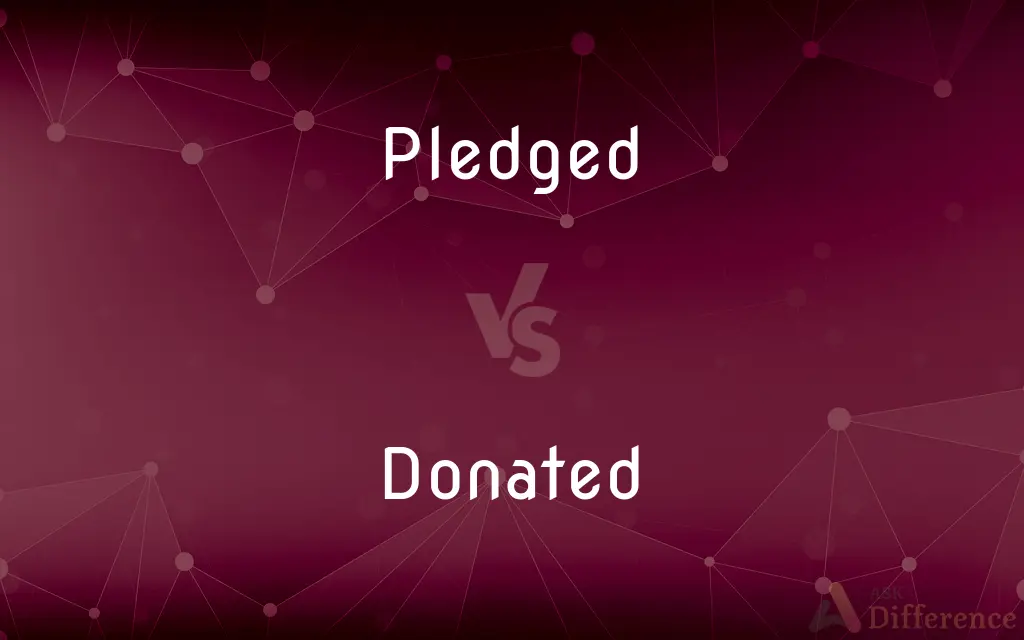Pledged vs. Donated — What's the Difference?
By Tayyaba Rehman & Maham Liaqat — Published on March 1, 2024
Pledging involves committing to give a specific amount of money or resources in the future, while donating refers to the actual act of giving those resources or money to a cause or organization.

Difference Between Pledged and Donated
Table of Contents
ADVERTISEMENT
Key Differences
Pledging is the act of making a commitment to donate, often stated in a formal promise or announcement, before the actual transfer of funds or resources has taken place. It's a forward-looking action that indicates an intention to support financially or materially at a future date. Donating, on the other hand, is the act of giving money, goods, or services to a cause or organization, representing the fulfillment of such a commitment or an immediate contribution without prior promise.
The process of pledging allows organizations to forecast future support and plan their activities accordingly. It can be particularly important in fundraising campaigns or charitable initiatives, where the anticipation of funds plays a crucial role in strategizing and budgeting. Donating provides immediate support, enabling organizations to act or respond to needs without delay, making it crucial for emergency relief efforts or ongoing projects requiring consistent funding.
Pledges can sometimes be conditional, based on the achievement of certain goals or matching funds from other donors, adding a strategic element to fundraising efforts. This approach can motivate additional contributions by leveraging the initial pledge as a catalyst. In contrast, donations are typically unconditional gifts that directly support the recipient's objectives, offering more straightforward financial or material assistance.
The impact of pledging versus donating can also differ over time. Pledges help build momentum in fundraising campaigns, creating a sense of community and shared purpose among potential donors. Actual donations, especially when made publicly, can inspire others to contribute, demonstrating tangible support and encouraging a culture of giving.
Both pledging and donating are essential components of charitable giving and fundraising. While pledges set the stage for future support, donations deliver the immediate resources needed to make a difference. Together, they represent the lifecycle of charitable contributions, from intention to action.
ADVERTISEMENT
Comparison Chart
Definition
Committing to give in the future
Actual act of giving
Status
Intentional, future-oriented
Immediate, action-oriented
Conditionality
Can be conditional
Typically unconditional
Impact on Planning
Allows forecasting and planning
Provides immediate support
Role in Fundraising
Builds momentum, encourages more pledges
Offers tangible support, inspires others
Compare with Definitions
Pledged
A promise to give money or resources at a future date.
She pledged $500 to the charity’s building fund.
Donated
Giving money, goods, or time to support a cause.
He donated $100 to the disaster relief effort.
Pledged
Reflects a commitment to future support.
They pledged ongoing assistance to the program.
Donated
Encourages a culture of giving through example.
Her generous donation inspired others to give.
Pledged
Often part of fundraising campaigns.
During the telethon, hundreds pledged support.
Donated
Represents immediate contribution.
Donated food supplies arrived at the shelter today.
Pledged
Can be conditional upon reaching goals.
His donation was pledged, conditional on matching funds.
Donated
Typically unconditional and varied in form.
They donated their old car to the vocational school.
Pledged
Helps organizations plan future projects.
Pledged funds allowed the nonprofit to budget for the next year.
Donated
Enables direct action and relief.
Donated funds were immediately used to buy medicines.
Pledged
A solemn binding promise to do, give, or refrain from doing something
Signed a pledge never to reveal the secret.
A pledge of money to a charity.
Donated
To present as a gift to a fund or cause; contribute.
Pledged
Something given or held as security to guarantee payment of a debt or fulfillment of an obligation.
Donated
To make a contribution to a fund or cause.
Pledged
Delivery of goods or personal property as security for a debt or obligation
A loan requiring a pledge of property.
Donated
Simple past tense and past participle of donate
Pledged
To offer or guarantee by a solemn binding promise
Pledge loyalty to a nation.
Pledge that the duties of the office will be fulfilled.
Donated
Having been given freely rather than purchased.
Pledged
To accept as a prospective member of such an organization.
Donated
Given freely especially to a cause or fund; as, the donated van made their meal-on-wheels venture possible.
Pledged
To make a solemn binding promise; swear.
Donated
Given freely especially to a cause or fund;
The donated van made their meal-on-wheels venture possible
Common Curiosities
What happens if a pledged amount is not donated as promised?
If a pledged amount is not donated, the organization may need to adjust their plans or budgets accordingly. Legal action is rare but can be pursued for significant unfulfilled pledges in some jurisdictions.
Is a donation tax-deductible when pledged or when actually donated?
A donation is usually tax-deductible in the year it is actually made, not when the pledge is made.
Can a pledge be cancelled?
Yes, a pledge can typically be cancelled or modified before it is fulfilled, as it is a commitment rather than an immediate transaction.
Do all pledges turn into donations?
Not all pledges turn into donations due to various reasons, including financial difficulties or changes in intention.
How important are pledges in large fundraising campaigns?
Pledges are crucial in large fundraising campaigns, as they help set fundraising goals and motivate others to contribute by showing anticipated support.
Can both individuals and corporations make pledges and donations?
Yes, both individuals and corporations can pledge and donate to causes, often with differing motives and benefits, such as tax deductions or corporate social responsibility initiatives.
How do nonprofits encourage pledging and donating?
Nonprofits encourage pledging and donating through campaigns, events, and personalized outreach, emphasizing the impact of contributions.
How do organizations record pledges?
Organizations record pledges as future receivables, acknowledging the promised funds in their financial planning and reporting.
Are there restrictions on how donations can be used?
Donations can have restrictions based on the donor's wishes, designated for specific projects or uses, whereas others may be unrestricted.
What role does trust play in pledging and donating?
Trust is fundamental; donors must trust that their contributions, whether pledged or donated, will be used effectively and as intended.
Share Your Discovery

Previous Comparison
Inspection Chamber vs. Manhole
Next Comparison
Earths’ Lithosphere vs. Earths’ AsthenosphereAuthor Spotlight
Written by
Tayyaba RehmanTayyaba Rehman is a distinguished writer, currently serving as a primary contributor to askdifference.com. As a researcher in semantics and etymology, Tayyaba's passion for the complexity of languages and their distinctions has found a perfect home on the platform. Tayyaba delves into the intricacies of language, distinguishing between commonly confused words and phrases, thereby providing clarity for readers worldwide.
Co-written by
Maham Liaqat















































